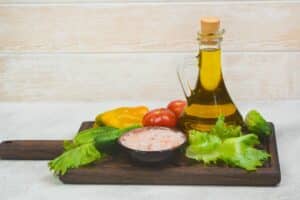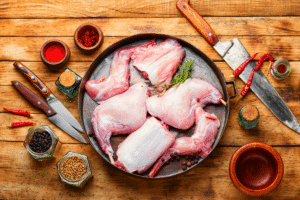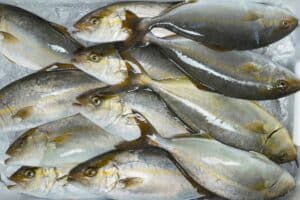An aged egg is certainly a…unique choice for a snack. And it certainly won’t be for everybody. But for the brave few, it is a bold and adventurous option to try.
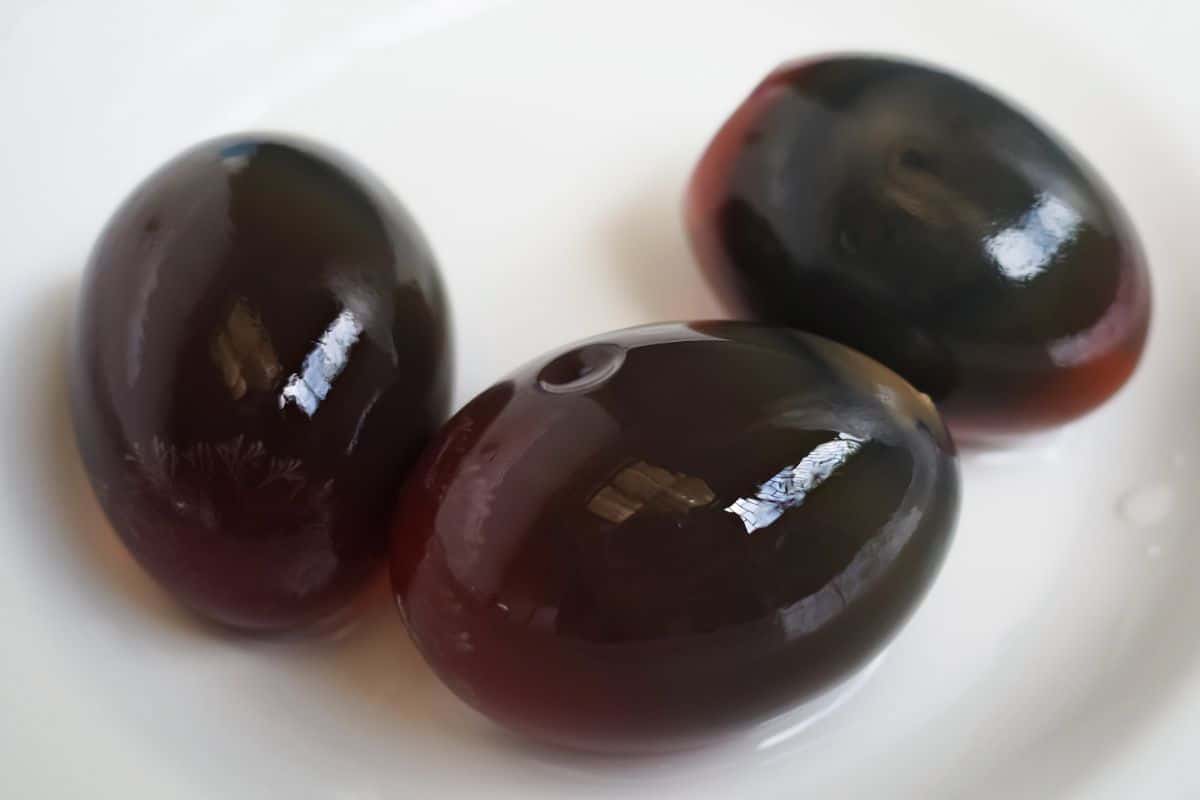
A century egg is a kind of egg that is often made by combining a variety of ingredients such as Chinese spices, salt, rice wine, and a hint of lime. They are then left to age for around three months when they are finally ready to be consumed.
As we said…definitely unique. Especially when you take its odd appearance that often looks rotten or spoiled into consideration. But if you’d like to learn more about this old egg and how it tastes, you’ll want to keep on reading.
What Is A Century Egg?
A century egg is a type of egg, usually a chicken or duck egg, which has then been coated in a combination of clay, salt, and ash. And its origins date back a pretty long time, we’re talking the 1600s-1900s.
It came about as Chinese farmers looked to find a way to extend the shelf life of the egg. And in places such as China, this old and unappealing-looking egg is actually considered quite a delicacy.
These eggs are soaked in water and covered for upwards of 100 days. They also tend to have an almost ammonia-like odor that can be off-putting to many. But this just comes from the food’s high alkalinity levels.
Another thing that can make individuals dubious about trying the delicacy is its appearance. With a dark green yolk, a now brownish-yellowish egg white, along with a black outer crust, it can look as if it’s gone off. But don’t worry, despite its appearance, it is still safe to consume.
Century Egg – The Process Of Creating It
When it comes to making a century egg, it is imperative to select the correct eggs. Only the freshest eggs are suitable for the aging process since dry and cracked shells often crack or break during the boiling process. Next up is the boiling process we just mentioned.
The fresh egg will be cooked thoroughly in a water and salt solution. Then when it comes to the pickling solution, the salt must be fully dissolved and the ingredient lime will also be added to the mix.
Finally, these eggs are then placed into jars or buckets with lids and left for upwards of 100 days when they will finally be ready for consumption.
During this time the eggs will then turn from that typical white and yellow color to a dark brown, black, or greenish hue. Once the 100 days are over, the eggs are then peeled with precision.
What Do Century Eggs Taste Like?
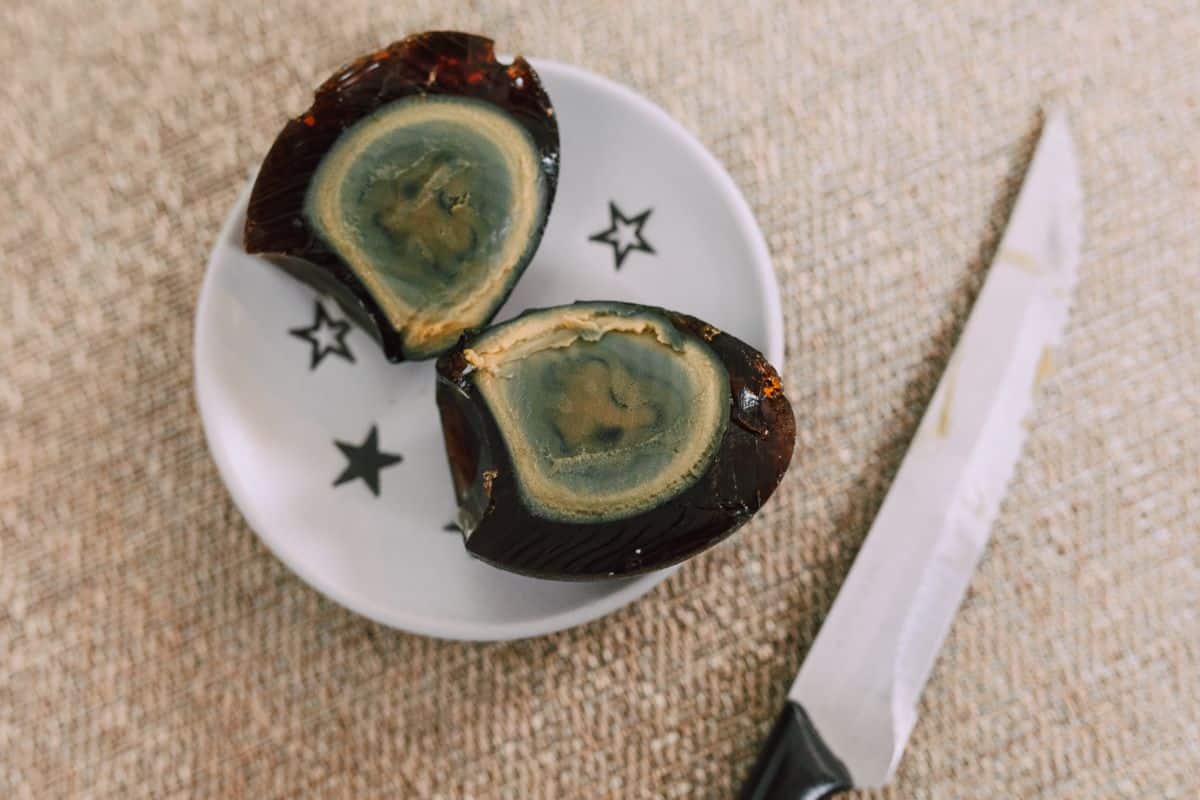
Now, we probably haven’t sold this egg to you in a way that sounds amazingly appetizing, so you may be wondering if it even tastes good at all. And well, whether you will like them personally or not will come down to personal preference.
Generally speaking, though, these eggs are described as having an earthy flavor with an underlying ammonia-like aftertaste.
It’s important to remember, though, that there are a few different ways you can prepare a century egg, and depending on how it is prepared the flavor can change. In China, these eggs are often eaten as a snack or beside dishes such as noodles.
Many note that it is much more palatable to add a little extra flavoring to the mix, such as soy sauce, ginger, and scallion.
But to know for sure whether or not you’ll like it…there’s only one way to find out…be brave and try it for yourself! You never know, you might actually be pleasantly surprised!
Are Century Eggs Healthy?
Would you be more convinced to try this aged and old egg if you knew of its health benefits? Well, let’s take a look. Century eggs are actually pretty healthy, making them a perfect afternoon snack or an extra addition to a meal.
They are packed full of protein and are also low in carbs too. This means they could be a popular option for people following low-carb diets such as Keto. Not only this, but they are very rich in both minerals and vitamins.
In particular, century eggs are high in Vitamin A which can help with eyesight health. There’s also a decent amount of calcium in these eggs which helps to regulate your heartbeat as well as keep your bones healthy and strong.
It is also said that due to their high levels of sulfur amino acids, they are great for giving you clear and beautiful skin as well as long and strong nails. However, as of yet, there is no actual scientific evidence to support this.
Do Century Eggs Need To Be Cooked?
These eggs are cooked before they are cured and aged, so no, you won’t need to cook them before tucking in. If you fancy it, you can just peel them and eat them exactly as they are.
Top tip for you, though, soaking your egg in water for a couple of hours before you consume it helps to make the yolk gooier and also makes the egg a lot easier to peel. You can also choose to add them to a selection of other dishes too.
They go great in a variety of salads, pasta dishes, and stir-fries. If you want to cook the egg, you can do this too. Just keep in mind that cooking the egg does change the flavor somewhat.
Final Thoughts
With a strong and pungent odor and a unique and distinctive earthy and ammonia-like flavor, these eggs definitely won’t be for everyone. Many actually struggle to get past the appearance of the egg alone.
But if you are feeling brave and adventurous, it’s a great new food to give a try. And what’s the worst that can happen? You don’t like it and don’t eat it again?
However, despite their many health benefits, it is advised that if you do enjoy these eggs that you only ever eat them in moderation.
This is because century eggs can tend to have high levels of hydrogen sulfide which can cause blockages in the arteries as well as cause inflammation of the blood vessels when consumed in excess.
As a one-off snack or occasional addition to a meal, though, they provide a great source of protein, contain many beneficial vitamins and minerals, have little sodium content, and have no fat or cholesterol. So, why not throw caution to the wind and try this unique Chinese delicacy today?



